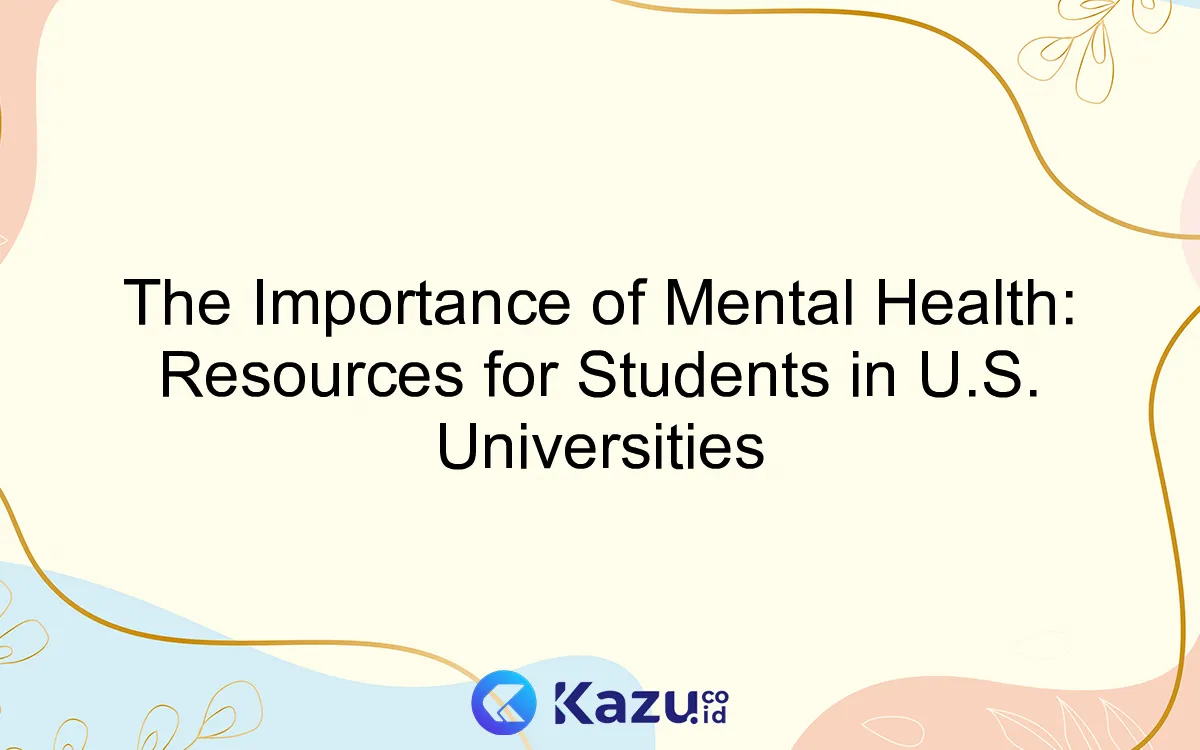In the midst of the demanding academic and social pressures faced by students in U.S. universities, it is crucial to prioritize mental health. This article highlights the significance of mental well-being and explores the resources available to support students in their journey towards maintaining a healthy mind.
Understanding the Importance of Mental Health for International Students
Mental health is a crucial aspect of well-being, especially for international students studying in U.S. universities. Being away from home, adapting to a new culture, and facing academic pressures can significantly impact their mental well-being. It is essential to recognize the importance of addressing mental health concerns among international students and providing them with proper support.
One of the primary challenges faced by international students is homesickness and feelings of isolation. Being in a foreign country without familiar support systems can lead to loneliness and depression. Therefore, universities need to create a welcoming environment and offer counseling services to help students cope with emotional difficulties.
Academic stress is another important factor affecting the mental health of international students. The pressure to excel in studies, language barriers, and different educational systems can contribute to anxiety and low self-esteem. Universities should provide academic resources, such as tutoring programs and workshops, to support students in their academic journey.
Cultural adjustment is also a significant aspect to consider. International students may face challenges in understanding and adapting to new social norms, customs, and academic expectations. Offering cultural orientation programs and mentorship opportunities can assist students in overcoming these challenges and feeling more connected to their new environment.
Furthermore, raising awareness about mental health and reducing the stigma surrounding seeking help is vital. Universities can organize workshops, seminars, and campaigns to educate students about mental health issues and available resources. They should also ensure confidential and easily accessible counseling services to encourage students to seek assistance without hesitation.
In conclusion, understanding the importance of mental health for international students is paramount for providing the necessary support and resources they require. By addressing issues related to homesickness, academic stress, cultural adjustment, and stigma, universities can create a conducive environment that fosters the well-being of international students.
Mental Health Resources and Support Services in U.S. Universities

In recent years, the importance of mental health among students in U.S. universities has gained significant recognition. Recognizing the unique challenges students face, universities have made efforts to prioritize their mental well-being by providing various resources and support services.
Many universities offer counseling services, where students can seek professional help from licensed therapists or psychologists. These services aim to provide a safe and confidential space for students to discuss their concerns, cope with stress, and manage mental health issues. Students can schedule appointments and attend individual or group therapy sessions to address their specific needs.
In addition to counseling services, universities often organize workshops and support groups focused on mental health. These initiatives aim to promote awareness, educate students about mental health, and provide practical strategies to enhance resilience and well-being. Students can participate in mindfulness sessions, stress management workshops, or peer support groups to find solace and build a network of support.
Furthermore, many universities have helplines or crisis hotlines available 24/7. These services are designed for students experiencing immediate distress and require immediate assistance. Trained professionals are available to provide guidance, crisis intervention, and referrals to appropriate resources. This ensures that students have access to support, even outside of regular office hours.
Universities also collaborate with local healthcare providers and psychiatric clinics to offer comprehensive mental health services. These partnerships enable students to access psychiatric consultations, medication management, and specialized treatment if needed.
It is crucial for students to be aware of the mental health resources and support services available to them. Universities often provide detailed information about these services on their websites, including contact details and operating hours. Additionally, university staff members such as academic advisors and resident advisors can provide guidance and help students navigate the available resources.
Overall, the recognition of mental health as an important aspect of student well-being has led to the development of a range of resources and support services in U.S. universities. By making these services easily accessible, universities aim to prioritize the mental health of their students and provide them with the necessary support to thrive academically and personally.
Self-Care Techniques for Maintaining Mental Well-being
When it comes to maintaining mental well-being, it’s essential for students in U.S. universities to prioritize self-care. College life can be stressful, and neglecting mental health can have serious consequences. Fortunately, there are several effective self-care techniques students can employ.
1. Prioritize Sleep:
Getting enough sleep is crucial for mental well-being. Develop a consistent sleep schedule and create a relaxing bedtime routine.
2. Stay Active:
Regular exercise releases endorphins, which can boost mood and reduce stress. Engage in physical activities such as yoga, jogging, or sports.
3. Practice Mindfulness:
Mindfulness techniques, such as meditation or deep breathing exercises, can help reduce anxiety and improve focus.
4. Maintain a Balanced Diet:
Eating a nutritious diet with plenty of fruits, vegetables, and whole grains can provide the necessary nutrients for brain function.
5. Seek Support:
Reach out to friends, family, or campus resources when in need. Talking about your feelings and concerns can ease the burden.
6. Set Realistic Goals:
Breaking down tasks into manageable goals can reduce overwhelm and increase motivation.
7. Engage in Hobbies:
Participate in activities you enjoy, whether it’s painting, playing an instrument, or reading, as a form of relaxation and self-expression.
Remember, self-care is not selfish, but necessary for overall well-being. Prioritizing mental health will contribute to a more successful and fulfilling university experience.
Conclusion
In conclusion, mental health is of utmost importance for students in U.S. universities. With the increasing prevalence of mental health issues, it is essential for universities to provide resources and support systems to ensure the well-being of their students. By promoting awareness, offering counseling services, and implementing preventive measures, universities can create a conducive environment for students to thrive academically and personally.
